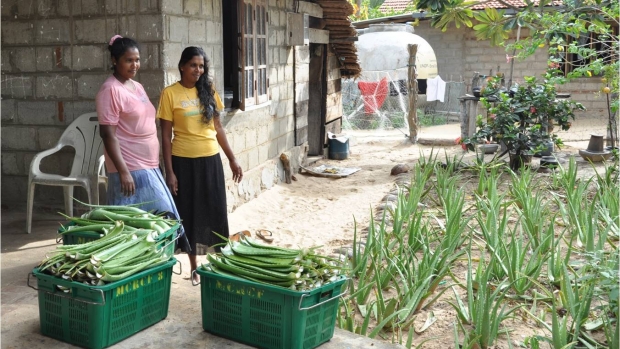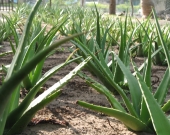Grants :: Small Grant Facilities :: Empowering fisherwomen by generating additional income from the cultivation of Aloe vera (Phase 1)
Empowering fisherwomen by generating additional income from the cultivation of Aloe vera (Phase 1)

Aloe vera plantation managers , Sri Lanka © S. Christensen, 2011
Objectives
This project had four main objectives:
- To reduce pressure on Bar Reef and its associated marine and coastal resources;
- To increase the income of poor coastal householders;
- To empower women and
- To stimulate income generation.
Background
Puttalam Lagoon is renowned in Sri Lanka for its finfish and crustacean fishery. The lagoon supports over 3,000 fishermen from 28 registered fishery societies, who together are responsible for increasing exploitation pressure on the natural resources. Communities around the lagoon have responded to declining fishery production and rising fuel prices by intensifying their fishing efforts, causing negative impacts on the vital reef ecosystem and its biodiversity. Because land-based income opportunities are limited, and local crop-growing conditions are generally unfavourable, alternative ways of generating household income are needed that are cost-effective and environmentally friendly. To this end, the project sought to encourage households to cultivate Aloe vera to meet the high demand for its products in the medicine and cosmetics industries.
Aloe vera (known locally as komarika) is a multi-purpose plant. Aloe gel is the base for soaps, body lotions, skin care products, foot creams and many modern cosmetics, and reportedly has antiseptic properties. The latex is a well-known laxative. In recent years, the demand for Aloe vera products has grown rapidly both locally and internationally.
Aloe vera thrives in the dry, sandy conditions around Puttalam lagoon, and wild plants collected from this area have long been used for soaps, lotions, creams and other products by cosmetic manufacturers in Sri Lanka. Using an MFF small grant, the Marine and Coastal Resources Conservation Foundation (MCRCF), an NGO based in Kalpitiya, launched a programme to cultivate Aloe vera on the homesteads of 15 selected fisher families.
The introduction of a supplementary means of generating income, especially for local women, was considered a feasible approach to reduce fishing pressure. MCRCF implemented the project in collaboration with three local fishery societies: the Semuthu Fisheries Cooperative Society in Kudawa and the St Sebastian Fisheries Cooperative Societies in Kudawa and Anawasala.
Target beneficiaries
Fifteen fisher families in Puttalam Lagoon.
Outputs
- Training of 15 fisher families, especially the women, in cultivating Aloe vera.
- Provision of plants and necessary tools to the families. About 575 Aloe vera plants were given to each family.
- The establishment of a buy-back system operated by MCRCF.
- Provision of an improved income-generating activity for 15 fishing families.
Accomplishments and challenges
Fifteen poor fisher families now have an alternative source of income. The project also successfully linked the families to Janet Ayurveda, a cosmetics company wanting to procure Aloe vera for its products.
Self-confidence was built up among poor families who used to be engaged only in fishing activities. More fisherfolk now focus on cultivating Aloe vera and spend less time fishing.
Contributions to cross-cutting themes
Gender equality.
Aloe vera cultivation has been aimed primarily at women, giving them a livelihood of their own and empowering them economically.
Lessons Learned
Demand for Aloe vera plants has grown rapidly among fisher families. A plant nursery should be established to meet this demand.
Mulching is required, but chemical fertilisers are unnecessary. Too much shade has a negative impact on plant growth.
The creation of market linkages by MCRCF was an important contributor to success. With MCRCF’s support, an Aloe vera cultivators’ society was formed and links made to reputable private companies, allowing households to expand cultivation.
The diversification of livelihoods has helped to reduce pressure on coastal ecosystems and resources, as fisherfolk spend more time on cultivation and less time fishing.
MCRCF is continuing to support the project by giving free technical advice to local people interested in cultivating Aloe vera. More and more fisher families are turning to Aloe vera cultivation, as it is proving to be not just a supplement to their income, but also a profitable business in its own right.
Related News
Aloe vera: the wonder plant to save Puttalam Lagoon
Kalpitiya (Puttalam district), Sri Lanka 24 Feb 2013
Country: Sri Lanka
Topic: Sustainable Livelihoods, Sustainable Business Practices, Gender equality
This article has been previously published in Sunday Times on 24 February 2013. The author is Dr Sriyanie Miththapala, Consultant to IUCN Sri Lanka
Project Facts
Country
Location
Puttalam, Sri Lanka
Topic
Duration
1st Jan 2009 to 31st May 2009
MFF Grant Amount
US$4,386
Implementing Partner
Marine and Coastal Resources
Conservation Foundation (MCRCF)
School Lane, Kandakuliya North,
Kalpitiya, Sri Lanka
Tel: +94 32 3292516
“The project built trust in
the alternative livelihood option among the communities dependent on coastal resources.”
— HASANTHA AMARASEKERA
PROJECT MANAGER, MCRCF

